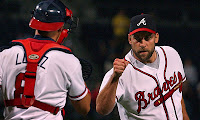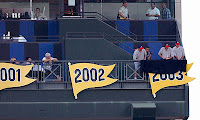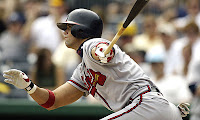


As a life-long Braves fan, I feel honored to share my thoughts on America’s Team with Fight.Boredom’s readership. I could write endless pages about Hank Aaron’s 715th homerun, Dale Murphy’s sweet swing, Sid Bream’s famous slide, Greg Maddux’s mastery of hitters in the mid-1990s, or any of the thousands of exhilarating moments that have made me proud to cheer on my hometown team.
Unfortunately, I have been asked to write about a very touchy subject for any supporter of Atlanta’s ballclub: the month of October. Why is it that a team renowned, praised, envied, and sometimes loathed for its dominance in the regular season routinely fails to win the World Series title, or (in recent years) even advance to the second round of the playoffs?
The simple answer, often espoused by the ex-jocks and studio analysts on Fox television, is that the Braves have “choked”. The implication, of course, is that the Atlanta Braves players and coaches faltered as a result of their inability to respond to high-pressure situations. To a certain extent, they’re right. Where I disagree with application of the term “choke” to the Braves’ postseason woes is the notion that the Braves players should receive the blame of each early postseason exit. Below are some other factors that I believe have contributed to the Braves’ relative lack of success in October.
Marathon vs. SprintingWhat is required to win a division title is a team built for the marathon of the regular season. A Major League squad plays 162 games a year, and the teams that are able to cope with the injuries, exhaustion and other hardships of the arduous schedule are the ones that are in the best position to compete for a division title.
The structure of the playoff system, however, does not reward those teams that are prepared for the long-distance race. Unlike the end of a marathon, the playoffs effectively strip the top participants in baseball’s “race” of whatever lead they hold over their competitors at the end of 162 games. Suddenly, a team that has won 100 games during the season is placed in the same position as another team that won 85 games.
Thus, the playoffs become more like a sprint to the finish line, where each of eight teams is given the chance to toe the same starting line. Like a marathon runner, however, the Braves are not conditioned for a sprinting contest.
The Braves’ strengths lie in the depth of their pitching staff, in the ability to outlast other teams through the rigors of the regular season, and in their willpower to overcome injuries and exhaustion. Once the playoffs start, those strengths are neutralized.
Power pitchingThe past couple of years have shown that teams with a pair of power starting pitchers have a better chance of success in a short postseason series. The best example is the Arizona Diamondbacks of 2001, who rode Curt Schilling and Randy Johnson to a World Series triumph over the New York Yankees. Schilling and Johnson pitched in seemingly every game and thus the Diamondbacks were able to hide the weaknesses of their other pitchers.
But even beyond the ability to mask the chinks in Arizona’s armor, Schilling and Johnson met great success in the postseason because of their style of pitching. When the playoffs arrive, the strike zone tends to shrink, leaving pitchers with the option of blowing the ball by hitters or risk getting hit.
The Braves have not had a starting pitching staff that can blow hitters away. John Smoltz is their best postseason pitcher, and it is no surprise that he is a power pitcher. Tom Glavine and Greg Maddux, on the other hand, are capable of pitching great games in the playoffs, but often fall victim to a shrinking strike zone and bloop singles. Over the course of a season a game lost on unlucky drops or bloops can be overcome, but in the playoffs that kind of loss can be devastating to a team’s chances of winning a series.
Bad FortuneTo lose so many postseason series, the Braves must be bitten by some bad luck. Looking back over their losses, it is easy to identify dozens of one or two run games where a seeing-eye single or a bloop hit could have made the difference in a win or a loss. The Braves have also had their share of good luck (e.g., Sid Bream’s slide), but it doesn’t seem to come in the World Series and hasn’t been around in a long while.
OverachieversIn the one year that the Atlanta Braves won the World Series, it was an upset of sorts. The Braves were not a better team than the powerful, experienced Cleveland Indians. In fact, with the exception of 1996 and 1997, I would argue that the Braves were never the best team in the league. From 1991 to 1993, they endured exhausting pennant chases and in other years they struggled to get to the post-season. It has not been often during the past decade that the Braves were expected to win it all.
The best example is the 1999 club. They lost Andres Galarraga to cancer and Javy Lopez to a knee injury. Despite one of the weakest lineups in the National League, the Braves fought off the Houston Astros and New York Mets in dramatic fashion to advance to the World Series. While the TV pundits were calling for the winner of the Series to be crowned “Team of ‘90s”, no one seemed to notice how decimated the Braves were at that point. After the Yankees swept the Braves in the Series, little was said about how remarkable it was that the Braves had even made it to the Series. As the 1999 club has shown, simply because the Braves make an annual trip to the postseason does not mean that they have an equal chance, season-to-season, of winning it all.
EnthusiasmThe Braves’ clubhouse is well-known for being a “professional” atmosphere. Success in the regular season requires some emotional restraint and a business-like attitude to endure the day-in, day-out demands of the schedule. Come playoff time, though, teams feed off of emotions, both of the other players and of the fans. In recent years, the Braves have lacked the outward fire that can energize a squad and motivate a team to victory. Their seeming apathy is reflected in the empty seats of Turner Field. Because the Braves play their postseason games in a regular season environment, the sense of urgency needed for success in the postseason is missing.
There is more to blame for the Braves’ postseason failures than the players and coaches. The above factors all have a hand in the end of each season for America’s Team. At the same time, the Braves are capable of overcoming each of the above challenges and it seems that every once in a while they would. For now, I’ll stay content with the Braves’ amazing run of success and keep my fingers crossed for next year.
- Will Homiller, Troutman Sanders
fb





